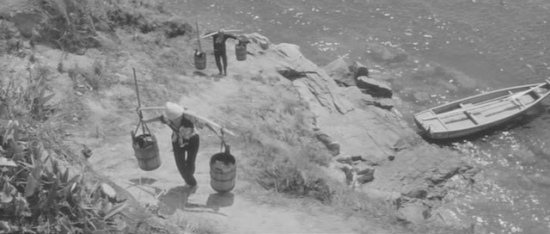The Small Things that Accumulate

So you want to be a cinephile. Okay, I got a movie for you about farmers on a small island, a movie with no dialogue and for most of it we just watch the farmers going about their daily routines, tending crops. Sound like something you want to see? No? You are not ready. In fact, 1960's The Naked Island (裸の島) not only beats The Naked Spur in terms of films most severely to disappoint audiences attending in the hopes of seeing nudity, it's also an incredibly good film, a film that successfully evokes the desperation in day to day living for these isolated subsistence farmers.

A woman, her husband, and two boys make up this family who for some reason have ended up supporting themselves this way rather than attempting to find other employment on the nearby, more populated island. The parents' daily ferry the elder of the two little boys to the other island for school, perhaps in the hopes that he'll break a cycle of living that's likely gone on for generations.
We never learn the names of any of the characters--as I said, the movie has no dialogue. It's not a silent film--there's the sound of wind on the hillside, water sloshing out of the buckets they carry up the hill, grunts, the children laughing. It's not so much that they don't talk as that director Kaneto Shindo has made the conscious decision to show only portions of these people's lives in between when they speak, and this turns out to be tremendously effective in conveying a sort of raw truth about their existence.

The first thirty minutes or so are spent watching the man and woman going to the larger island, ladling water from a rice field into two buckets each, taking them by rowboat back to their island to carefully carry the buckets up the hill.

There's a surprising amount of drama in watching them do this. Shindo and his cinematographer never cease to find new and interesting shots, shots that emphasise how treacherous the footing is on the hill and how obviously precious this water is.

If there's a central character, it's the wife, played by Nobuko Otowa, whose facial expressions are more often cut to, displaying a broader range of emotion than her more stoic husband. One assumes he grew up on the island and was raised in this life and just as I was wondering how he ever met Otowa in the first place, the movie got to a point where I actually had to rely on some of the Japanese I learned earlier this year;

It says "autumn" and it precedes a scene of a harvest festival. The family joins in with dancing and singing with farmers on the nearby island in addition, presumably, to trading. It's the one part of the year these people appear to have any fun.

In the latter portion of the film, something bad happens to them that causes them to grieve, but there is precious little time for it and we see Otowa lose her mind for a moment as the hideousness of life's monotony continues in spite of what's happened. And then her tears are quieted by the continuance of life. Shortly afterwards is the conclusion of this simple and strikingly effective film.